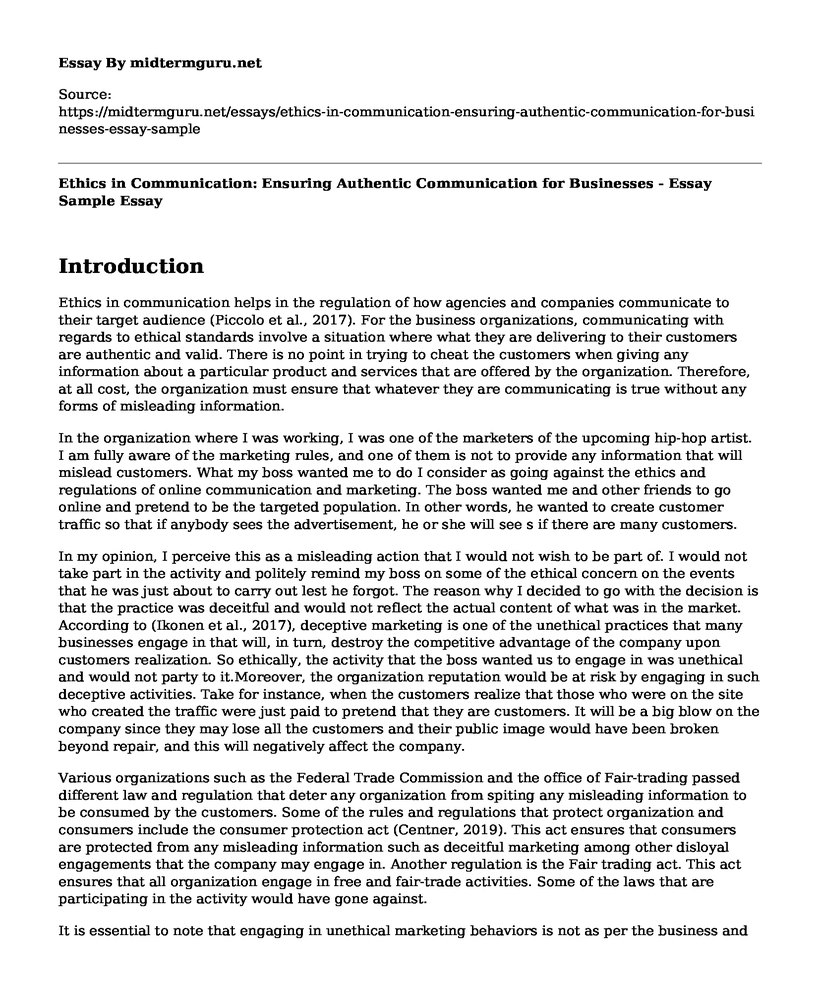Introduction
Ethics in communication helps in the regulation of how agencies and companies communicate to their target audience (Piccolo et al., 2017). For the business organizations, communicating with regards to ethical standards involve a situation where what they are delivering to their customers are authentic and valid. There is no point in trying to cheat the customers when giving any information about a particular product and services that are offered by the organization. Therefore, at all cost, the organization must ensure that whatever they are communicating is true without any forms of misleading information.
In the organization where I was working, I was one of the marketers of the upcoming hip-hop artist. I am fully aware of the marketing rules, and one of them is not to provide any information that will mislead customers. What my boss wanted me to do I consider as going against the ethics and regulations of online communication and marketing. The boss wanted me and other friends to go online and pretend to be the targeted population. In other words, he wanted to create customer traffic so that if anybody sees the advertisement, he or she will see s if there are many customers.
In my opinion, I perceive this as a misleading action that I would not wish to be part of. I would not take part in the activity and politely remind my boss on some of the ethical concern on the events that he was just about to carry out lest he forgot. The reason why I decided to go with the decision is that the practice was deceitful and would not reflect the actual content of what was in the market. According to (Ikonen et al., 2017), deceptive marketing is one of the unethical practices that many businesses engage in that will, in turn, destroy the competitive advantage of the company upon customers realization. So ethically, the activity that the boss wanted us to engage in was unethical and would not party to it.Moreover, the organization reputation would be at risk by engaging in such deceptive activities. Take for instance, when the customers realize that those who were on the site who created the traffic were just paid to pretend that they are customers. It will be a big blow on the company since they may lose all the customers and their public image would have been broken beyond repair, and this will negatively affect the company.
Various organizations such as the Federal Trade Commission and the office of Fair-trading passed different law and regulation that deter any organization from spiting any misleading information to be consumed by the customers. Some of the rules and regulations that protect organization and consumers include the consumer protection act (Centner, 2019). This act ensures that consumers are protected from any misleading information such as deceitful marketing among other disloyal engagements that the company may engage in. Another regulation is the Fair trading act. This act ensures that all organization engage in free and fair-trade activities. Some of the laws that are participating in the activity would have gone against.
It is essential to note that engaging in unethical marketing behaviors is not as per the business and marketing requirements. As depicted in the paper, many laws are against deceptive marketing. Thus, it was for my interest to evade the activity that I was asked by the boss to undertake. The operation would have come with various problems that could have cost me my job, and the image of the company would have been destroyed if the act were surfaced.
References
Centner, T. J. (2019). Consumers, Meat and Animal Products: Policies, Regulations and Marketing. Routledge. https://heinonline.org/hol-cgi-bin/get_pdf.cgi?handle=hein.journals/iicl28§ion=9
Ikonen, P., Luoma-aho, V., & Bowen, S. A. (2017). Transparency for sponsored content: Analysing codes of ethics in public relations, marketing, advertising and journalism. International Journal of Strategic Communication, 11(2), 165-178. https://www.tandfonline.com/doi/abs/10.1080/1553118X.2016.1252917
Piccolo, S., Tedeschi, P., & Ursino, G. (2017). Deceptive advertising with rational buyers. Management Science, 64(3), 1291-1310. https://pubsonline.informs.org/doi/abs/10.1287/mnsc.2016.2665
Cite this page
Ethics in Communication: Ensuring Authentic Communication for Businesses - Essay Sample. (2023, Jan 12). Retrieved from https://midtermguru.com/essays/ethics-in-communication-ensuring-authentic-communication-for-businesses-essay-sample
If you are the original author of this essay and no longer wish to have it published on the midtermguru.com website, please click below to request its removal:
- Essay on Tensions Between Creativity and Power
- Essay on Nonverbal Communication During the Negotiation Process
- Company Cost Minimization - Essay Sample
- Certifications of CompTIA - Paper Example
- Paper Example on Understanding International Business
- Evaluation Paper on Toy "R" Us Inc
- CSR: The 3Ps Strategy for Community Goodwill & Environmental Care - Essay Sample







